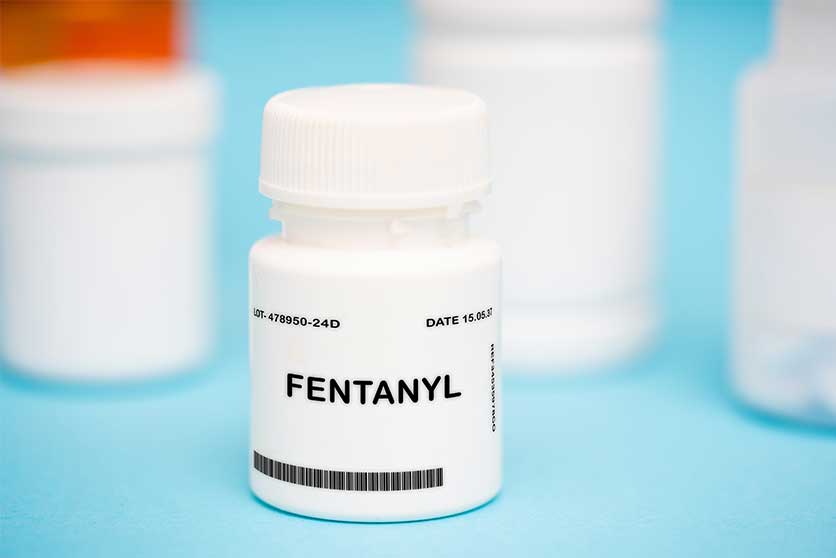Fentanyl Facts | Is Fentanyl An Opioid Or Opiate?

Medically Reviewed By: Manish Mishra, MBBS
Fentanyl is a man-made synthetic opioid narcotic and is up to 100 times stronger than morphine. It is used to treat severe pain in medical settings and also sold illicitly as a deadly and addictive recreational drug.

Fentanyl is a powerful and potentially lethal narcotic drug that has driven a new and terrifying epidemic of drug overdoses across the United States and Ohio.
It is critically important for all members of the public to develop a clear understanding of what fentanyl is, where it comes from, what its dangers are, and how to stay safe.
Is Fentanyl An Opioid Or Opiate?
All opiate drugs are opioids, but not all opioids are opiates.
Fentanyl is classified as a synthetic opioid, meaning that it is a fully man-made substance with properties and chemical structure related to pain-relieving substances that occur naturally in the tears or sap of the opium poppy.
The opioid class of drugs are generally divided into three classifications:
- opiates: natural drugs extracted from opium (morphine, codeine, thebaine)
- semi-synthetic opioids: opioids created by modifying naturally occurring substances (oxycodone, hydrocodone, hydromorphone, and oxymorphone)
- synthetic opioids: fully man-made substances produced in laboratories (fentanyl, carfentanil, pethidine, methadone, tramadol, and some experimental drugs)
Where Does Fentanyl Come From?
Pharmaceutical fentanyl is a Schedule II controlled substance produced in tightly regulated pharmaceutical laboratories. It can take the form of oral transmucosal lozenges/lollipops, buccal or sublingual tablets, sublingual or nasal sprays, transdermal patches, and injections.
Pharmaceutical fentanyl is used only to treat severe pain, including chronic pain and severe breakthrough pain from cancer and other serious medical conditions. It is a prescription drug and that’s dangerous to use by those who do not already have a high degree of opioid tolerance.
Illicit Fentanyl
Illicit fentanyl is likewise produced in laboratories, though these take the form of covert and illicit drug production operations. Illicit fentanyl can be produced as a liquid or a powder, and because of its potency vast numbers of doses can be transported using very small amounts of space.
Once fentanyl crosses a border it will be sold in a variety of forms, including:
- pressed into counterfeit pills or tablets resembling trusted prescription pain relievers like Vicodin, OxyContin, and others
- cut into supplies of other illegal drugs like heroin, cocaine, methamphetamine, or MDMA
- sold as-is after being heavily diluted with fillers
Effects Of Fentanyl
Fentanyl works by binding to the body’s opioid receptors, which are found in areas of the brain that control pain and emotion, as well as elsewhere throughout the central nervous system.
This binding mimics the effects of the body’s own natural endorphins, or pleasure hormones, though with greater potency of effect.
When taken, fentanyl and the other members of this class of drugs can have a wide variety of dose-dependent effects and side effects that may include:
- pain relief
- euphoria (extreme pleasure)
- relief from anxiety and mental stress
- drowsiness
- sedation
- nausea
- vomiting
- confusion
- constipation
- pupil constriction
- reductions in body temperature, breathing, blood pressure, and heart rate
Fentanyl Overdose
The effects of opioids on a particular person depend on how much they take, how they take it, their tolerance to opioid drugs, and how strong that particular substance is.
Since fentanyl and its analogue drugs are so much stronger than most other illicit and prescription opioids, even touching or accidentally inhaling an amount of fentanyl the size of a few grains of sand or less could trigger life-threatening opioid overdose symptoms.
The most important signs and symptoms of a fentanyl overdose include:
- unresponsiveness or loss of consciousness
- vomiting and choking or gurgling noises (the “death rattle”)
- small, pinpoint pupils
- cold, clammy, pale or bluish skin
- limpness and loss of coordination
- respiratory depression and slow, shallow, or stopped breathing
- no pulse/cardiac arrest
How To Respond To A Fenanyl Overdose
In 2021 alone, synthetic opioids (primarily fentanyl) were responsible for over 4,000 drug overdose deaths in the state of Ohio.
Many more deaths were only avoided thanks to rapid medical intervention and/or repeated doses of the over-the-counter opioid overdose antidote medication Narcan (naloxone).
If you suspect someone has overdosed on fentanyl, treat it as a medical emergency and:
- call 911
- administer naloxone if available
- provide first aid until first responders arrive, including CPR and using an AED if needed
How To Reduce The Risk Of Overdose
There are many ways to reduce the risk of overdose and drug use in Ohio, including:
- using fentanyl test strips on your drug supplies
- requesting a free supply of naloxone and keep it accessible
- never using drugs alone
However, the absolute best strategy for overdose prevention is to end drug abuse and seek effective treatment for opioid addiction from a qualified provider like the Ohio Recovery Center in Van Wert.
Opioid Addiction Treatment
Our treatment services for opioid use disorders include:
- medical detoxification to help manage withdrawal symptoms
- short- or long-term professional inpatient care
- dual diagnosis treatment to improve your mental health
- medication-assisted treatment options using buprenorphine, methadone, or naltrexone
- aftercare support
To learn more about our substance use disorder treatment and behavioral health care options, please contact us today.
- Centers For Disease Control and Prevention (CDC) https://www.cdc.gov/stopoverdose/fentanyl/index.html
- Data Ohio https://data.ohio.gov/wps/portal/gov/data/view/ohio-ibhd
- Drug Enforcement Administration (DEA) https://www.dea.gov/sites/default/files/2023-03/Fentanyl%202022%20Drug%20Fact%20Sheet.pdf
- Substance Abuse and Mental Health Services Administration (SAMHSA) https://www.samhsa.gov/medications-substance-use-disorders/medications-counseling-related-conditions/opioid-overdose

